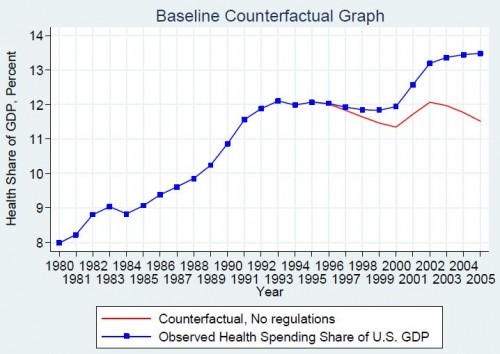From The Impact of the Political Response to the Managed Care Backlash on Health Care Spending: Evidence from State Regulations of Managed Care, by Maxim Pinkovskiy:
My results indicate that because of the political response to the managed care backlash, health care spending in a state with average HMO penetration in 1995 grew by 0.16 percentage points more per year than it would have otherwise, which is larger than the average change in the health care share across states in 2005. To assess the magnitude of my result, I use my regression to make a dynamic counterfactual forecast of the evolution of each state’s health care share under the assumption that the number of backlash regulations was equal to zero in every state and year, and aggregate the forecasts to predict the counterfactual for the U.S. health care share for each specification I run. I find that under the counterfactual of no political response to the managed care backlash, the U.S. health care share in 2005 would have been 11.52%, nearly two percentage points of GDP lower than the actually observed level, and somewhat below the 2000 level of 11.94%.
Here’s that result in chart form:
The paper includes a nice summary of the managed care backlash and research pertaining to it. It does not cite my favorite paper on it (which I quote here).


